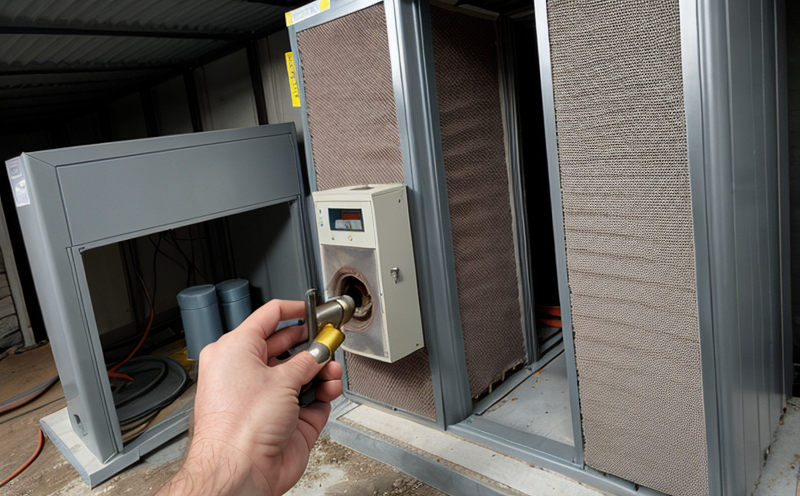EN ISO 9920 Estimation of thermal insulation and evaporative resistance from clothing ensembles
The CEN standard EN ISO 9920 is a pivotal document in the field of textile testing, specifically focusing on the estimation of thermal insulation and evaporative resistance provided by clothing ensembles. This method allows for an accurate assessment of how clothing will perform under various environmental conditions, ensuring that the ensemble provides appropriate protection against heat stress or cold exposure.
The standard is particularly relevant to industries such as military, fire services, construction, and sportswear where protective clothing is essential. The test aims to quantify both insulative properties and moisture vapor resistance of textile materials, which are crucial in determining their suitability for specific environmental conditions.
The process involves measuring the thermal insulation (I) and evaporative resistance (RE) of a textile ensemble using a standardized method. This approach ensures that the results are comparable across different materials and manufacturers, providing a robust framework for quality control and product development.
Thermal insulation is measured by determining the heat loss through the clothing under controlled conditions, while evaporative resistance assesses how effectively moisture vapor can pass through the fabric. These parameters are critical in understanding the overall performance of the ensemble against both heat and cold stress.
The test setup typically involves a climate chamber where the ensemble is subjected to specific temperature and humidity levels. The ensemble's thermal properties are measured over time, providing detailed insights into its insulation capabilities under realistic conditions. This information is vital for ensuring that the clothing meets regulatory requirements and performs as expected in real-world scenarios.
The results of these tests can significantly impact product development by highlighting areas where improvements can be made to enhance performance. For instance, if a particular ensemble demonstrates poor thermal resistance at higher temperatures, manufacturers may focus on selecting more insulative fabrics or adding additional layers for better protection.
Furthermore, the findings from EN ISO 9920 are essential for compliance with international standards and regulations. Many industries rely on these tests to ensure that their products meet stringent safety and performance criteria, thereby protecting workers in hazardous environments.
The standard also plays a crucial role in research and development by providing a consistent methodology for evaluating new materials and technologies. This consistency allows researchers to compare different approaches effectively, fostering innovation within the industry.
In summary, EN ISO 9920 is a vital tool for ensuring that textile ensembles provide effective thermal insulation and evaporative resistance. By adhering to this standard, manufacturers can produce products that meet both regulatory requirements and customer expectations, ultimately enhancing safety and comfort across various sectors.
Customer Impact and Satisfaction
- Enhanced Product Quality: Ensuring compliance with international standards like EN ISO 9920 significantly improves the quality of textile products. This leads to greater customer satisfaction as customers receive garments that perform reliably in challenging conditions.
- Increased Safety: Products tested according to EN ISO 9920 are safer, reducing risks associated with improper thermal and evaporative resistance. This enhances user confidence and satisfaction.
- Better Performance: Customers benefit from more effective clothing that provides optimal protection against heat stress or cold exposure, enhancing their overall experience.
- Easier Compliance: By adhering to this standard, manufacturers ensure easier compliance with international regulations, streamlining the sales process and broadening market access.
Clients who invest in EN ISO 9920 testing can expect higher levels of customer satisfaction due to superior product performance. This not only improves brand reputation but also fosters long-term relationships with satisfied customers.
International Acceptance and Recognition
- Global Consistency: EN ISO 9920 is widely recognized across Europe, ensuring that results are consistent regardless of the location. This global consistency enhances trust in the testing process.
- Regulatory Compliance: Many countries and regions reference this standard in their own regulations, making it essential for international trade and compliance.
The widespread acceptance of EN ISO 9920 underscores its importance in the textile industry. Its use across borders ensures that products meet high standards of performance and safety, fostering trust among consumers and businesses worldwide.
Environmental and Sustainability Contributions
The testing methodology outlined in EN ISO 9920 contributes positively to environmental sustainability by encouraging the development of more efficient and effective textile products. By identifying areas where improvements can be made, manufacturers are better equipped to reduce waste and energy consumption throughout the production process.
Moreover, the standard promotes the use of sustainable materials that offer superior thermal performance, reducing the need for additional layers or modifications post-production. This approach helps minimize the environmental impact associated with textile manufacturing and usage.
The results from EN ISO 9920 testing can also guide recycling efforts by providing insights into the longevity and durability of textiles. This information aids in designing products that are more easily recycled at the end of their lifecycle, further supporting sustainability goals.





